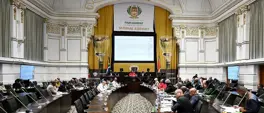Ramaphosa hails School Nutrition Programme as one of the most transformative policies
Babalo Ndenze
20 October 2025 | 9:00Ramaphosa said that the social programme provides much needed nutrition to more than nine million learners from poor households across the country on a daily basis.

President Cyril Ramaphosa speaks at the Tokyo International Conference on African Development in Yokohama, Japan, on 22 August 2025. Picture: X/PresidencyZA
President Cyril Ramaphosa has hailed the School Nutrition Programme as being one of the "most far-reaching" and transformative government policies to address poverty over the last three decades of democracy.
Ramaphosa said that the social programme provides much needed nutrition to more than nine million learners from poor households across the country on a daily basis and has had a positive impact on the schooling outcomes of these children.
Ramaphosa made the remarks in his latest newsletter which follows the 7th Social Justice Summit in Cape Town last week, which reflected on the country’s progress towards achieving food security as a key component of social justice.
Ramaphosa said that the provision of meals at schools with nutritious ingredients which are mostly sourced from school and community food gardens has had a positive impact on learner attendance, their concentration levels as well as overall academic performance.
He said that the long-term impact of the School Nutrition Programme is evident in the results.
Ramaphosa said that last year, learners from the poorest schools which make up 60 percent of schools, accounted for 67 percent of all bachelor passes achieved in the country.
But Ramaphosa notes that despite a range of interventions by national and provincial governments, a large portion of South African households remain food insecure.
Ramaphosa said that consumer inflation also hit a 10-month high with price increases in meat and vegetables, putting household food budgets under even more pressure.
He added that its necessary that together with current measures to eradicate extreme food poverty, the country has to also look at market factors that are making the cost of nutritious food increasingly out of reach.
Get the whole picture 💡
Take a look at the topic timeline for all related articles.















